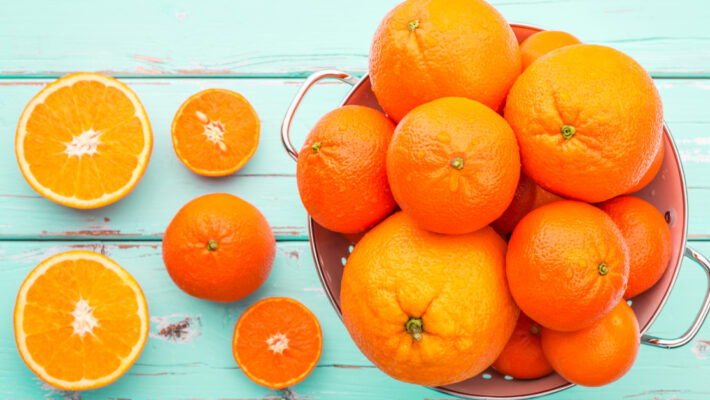
Phytonutrients for Better Health: Vitamin C
Vitamin C is an antioxidant phytonutrient (plant-based) of interest for its involvement in numerous biological reactions related to immune health. Unlike other mammals, with the exception of guinea pigs, primates, including we humans, do not synthesize vitamin C in the liver. A mutation in the gulonolactone oxidase (GULO) gene means that we must rely solely on dietary intake; otherwise, we’ll develop scurvy, among other health issues.
Eating vitamin C-rich foods is always preferable because whole plant foods contain lots of other beneficial phytonutrients, not just vitamin C. If fruits and vegetables are not available, vitamin C-fortified foods are second best; supplements may be necessary in the situation of advanced health need, or the presence of a genetic variant (GSTT1) in which the body cannot process dietary vitamin C effectively. Even in the United States where the availability of citrus fruits and other vitamin C-rich foods is relatively widespread, vitamin C deficiency is the fourth most common nutrient deficiency.[i]
Vitamin C-rich Foods
- Black currants
- Red peppers
- Kiwifruit
- Guavas
- Green bell peppers
- Oranges
- Strawberries
- Papayas
- Pineapples
- Lemons
- Grapefruit
Supporting the Immune System
In people who are otherwise healthy, their immune systems are capable of handling oxidative stress and otherwise support the body’s healing processes and immune system. Optimizing your immune system’s ability to perform its designated functions is a great reason to make sure you’re getting sufficient vitamin C in your diet. Here are three key functions that vitamin C performs within the human body:
- Promotes the proliferation of immune cells (T-cells, B-cells)
- Neutralizes free radicals (reactive oxygen species)
- Contributes to collagen production in skin cells
Vitamin C Deficiency/Insufficiency
Research suggests that prolonged vitamin C insufficiency leads to impaired immune function, resulting in a myriad of negative health conditions and outcomes [ii],[iii] Proponents of vitamin C supplementation encourage its prophylactic use to reduce oxidative stress and thus, fend off any compromise in immune function. Vitamin C supplementation for situational use is also recommended.
Vitamin C Requirements
Because vitamin C is a water-soluble vitamin, whatever the body doesn’t need will be excreted in the urine. In other words, the body does not readily store vitamin C – whether it comes from foods or a supplement, so regular, daily consumption is ideal. Consuming too much vitamin C all at once can irritate the stomach and cause irritation (vitamin C is acidic). You should spread your intake of vitamin C throughout the day, especially if you decide to take upwards of 2000mg/day. The current RDA is 75mg for healthy women and 90mg for healthy men.[iv] Smokers need an additional 35mg to combat the oxidative stress due to smoking.
Optimizing a Supplement
Traditional vitamin C supplements and multivitamins with vitamin C have low bioavailability. If you consume a large quantity to make up for the low bioavailability, you’re likely to experience extreme stomach discomfort. Some vitamin C-rich foods have similar drawbacks. Another spoke in the wheel is due to the transit through the G.I. tract. As the vitamin C comes in contact with enzymes, digestive juices, and bile salts that essentially “use up” most of the antioxidant capacity. This makes a liposomal vitamin C supplement more desirable. Liposome encapsulated vitamin C reaches all the way to the liver non-oxidized (not “used up”) and is 10-20 times more bioavailable than non-encapsulated vitamin C.[v] A liposomal form may be a little more expensive, but provides the anticipated health benefits and stomach upset is not a problem.
______________________________________________________________________________________________________________________________
[i] Carr AC, Maggini S. Vitamin C and Immune Function. Nutrients. 2017 Nov 3;9(11):1211.
[ii] Huijskens MJ, Wodzig WK, Walczak M, Germeraad WT, Bos GM. Ascorbic acid serum levels are reduced in patients with hematological malignancies. Results Immunol. 2016 Jan 12;6:8-10.
[iii] Carr AC, Rosengrave PC, Bayer S, Chambers S, Mehrtens J, Shaw GM. Hypovitaminosis C and vitamin C deficiency in critically ill patients despite recommended enteral and parenteral intakes. Crit Care. 2017 Dec 11;21(1):300.
[iv] Institute of Medicine (US) Panel on Dietary Antioxidants and Related Compounds. Dietary Reference Intakes for Vitamin C, Vitamin E, Selenium, and Carotenoids. National Academies Press (US), 2000.
[v] Milne, RD. (2004). PC Liposomal Encapsulation Technology. Henderson: Life’s Fountain Books.



